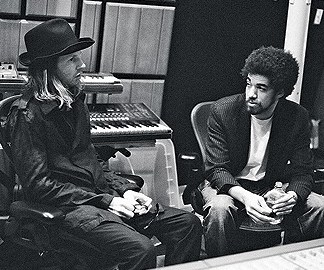Shakespeare in the Sex Pistols; A Danger Mouse for Dickens

Randy Kennedy’s “The Free-Appropriation Writer,” in today’s New York Times Week in Review, considers the ever-sensitive spectrum of borrowing (said another way, flattery; said another way, plagiarism) that has historically informed the creative arts and which, increasingly, possesses a new, valid space in literature. Yet if we concede that there are examples of more—and less—acceptable forms of borrowing we enter a critical grey zone. Who will judge, and why does it matter. At some point we are forced to concede simply that citing other authors’ words within the context of one’s own is nothing less than a way of exhibiting a certain literary fluency.
T. S. Eliot’s The Wasteland is perhaps the Ur-text of literary sampling; one of the pleasures in reading it is sourcing the various re-contextualizations of everything from sacred Sanskrit prayer texts to Shakespeare. David Shields’s new novel, “Reality Hunger,” is cited by Kennedy and sounds similar to Eliot in its ambition: it is “art,” not theft. And yet it is composed almost entirely from phrases written by other authors.
Kennedy writes:
Mr. Shields’s book relies on thinkers from Wittgenstein to DJ Spooky, melding them into a voice that can sound at times eerily consistent. He contends that in a world where the death of the novel has been announced with great regularity for almost half a century, such an open-source approach is the only way to keep literature alive. Even the most original-seeming writing borrows from the centuries of writing that came before, so why not simply be more honest and, he suggests, maybe do something more interesting in the process?
“So much of the energy of great work to me is feeling the echo effect on every line, of not knowing where it came from,” he said, citing a quote—this one attributed—from Graham Greene that he uses as one of the book’s epigraphs: “When we are not sure we are alive.”
So this is it: the phrase “open source” has been applied, finally, to the novel. Looking at the history of literature, one sees the clear trend of smart borrowing everywhere. Were I to write, right now, that all happy novelists borrow; all unhappy novelists borrow in their own way, most readers would respond to an echo in the prose without desiring either footnotes or the solace of specificity. This is our literature now, a new space within what we once considered a church of originality.
“There’s no such thing as originality, anyway,” says Hegemann. “Just authenticity.” So we shall see more Shakespeare in our Sex Pistols, perhaps, or celebrate a Danger Mouse for Dickens, and Didion. At least we will have our minds open.





